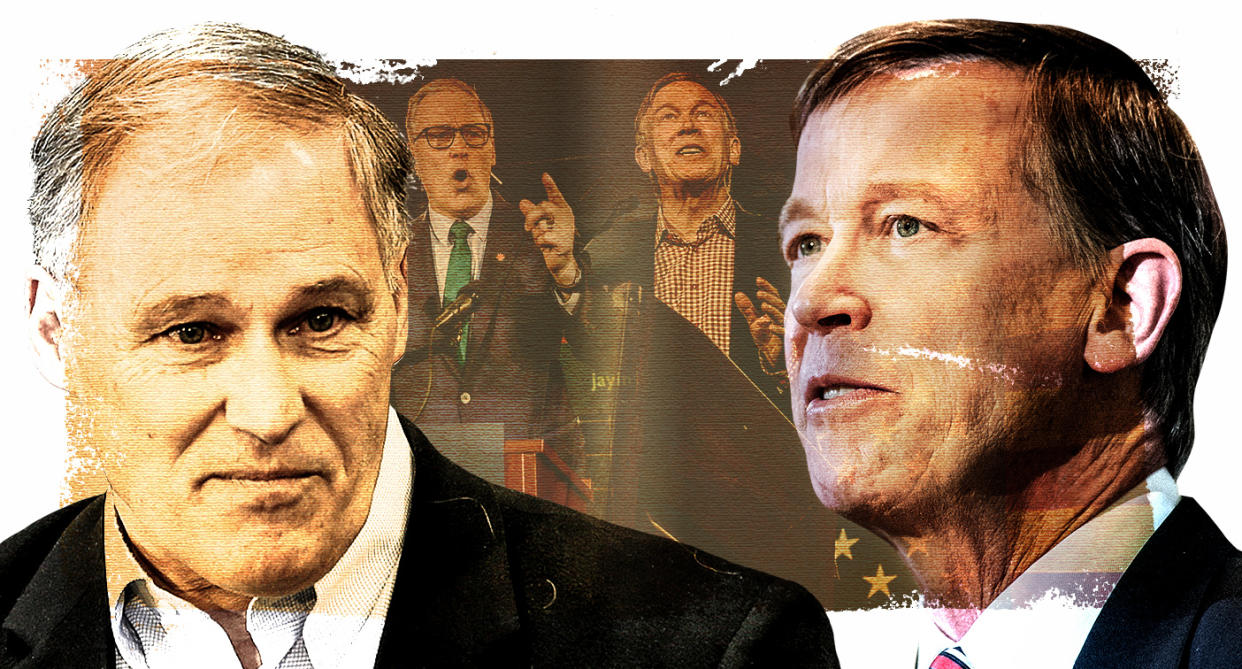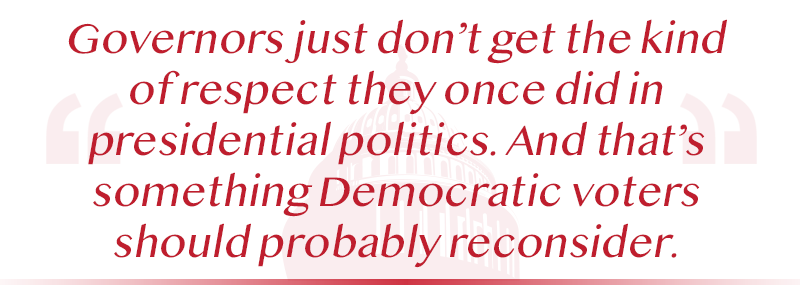If you're interested in governing, maybe choose a governor

In the last week, two Democratic governors got into the crowded 2020 presidential field.
One is Jay Inslee, the second-term governor of Washington, who’s running on a promise to finally deal with climate change. It’s not a terrible plan, although judging from his early interviews, it mostly hinges on using so many platitudes that many Americans who would normally be burning fossil fuels will fall asleep instead.
The other is John Hickenlooper, who just left office in Colorado after one of the more successful eight-year runs in the country.
Hickenlooper is exactly the kind of candidate his party would have pined for 20 years ago: a former big-city mayor and governor of a critical swing state, self-made founder of a string of brewpubs, personable in a Jimmy Stewart sort of way, progressive enough to satisfy the party’s various constituencies but pragmatic enough to have gotten things done.
As it is, Hickenlooper’s announcement was mostly met with a kind of knowing derision in the media and on the left, because apparently it’s now the job of political commentators to immediately write off any candidate who isn’t instantly recognizable from the Sunday shows and who isn’t shouting himself hoarse about the looming end of the republic.
Governors just don’t get the kind of respect they once did in presidential politics. And that’s something Democratic voters should probably reconsider.
Forgive me for geeking out a bit here, but the numbers tell an interesting story. For nearly five decades in American life, from the election of John Kennedy in 1960 to Barack Obama’s triumph in 2008, not a single sitting U.S. senator was elected president. (Two former senators, Lyndon Johnson and Richard Nixon, managed to win, but both had already served as vice presidents, and Johnson was already president when he ran.)
In the 30 years after Nixon’s resignation, meanwhile, four of the five men elected president came from statehouses. (The only outlier was George H.W. Bush.) During that entire time, each party nominated exactly one sitting senator, and both of them lost.
You don’t need a PhD in political science to understand why this was, so let me save you the 100 grand. After Vietnam and Watergate, and after a long period of exponential growth in the federal bureaucracy, Americans fell in love with the idea of an outsider who knew something about executive power and could sweep in to reform the whole damn thing.
Governors didn’t talk in the cautious, stentorian language of Washington. The best of them knew how to build coalitions and project a kind of easy authority. They had the advantage of being able to talk about their own achievements, rather than just critiquing someone else’s.

During the Reagan and first Bush years, the most captivating Democratic figures were governors like Mario Cuomo, Bob Kerrey, Ann Richards and Bill Clinton. The mere specter of a Cuomo candidacy shaped the presidential field in two consecutive elections, both of which he ultimately sat out.
(Here you can read an interview I did with Cuomo not long before he died, which is still one of my favorites, and which will remind you, if you lived through that time, of what a towering figure he was.)
Likewise, when Clinton was president, it was the emerging cadre of Republican governors — Tommy Thompson, John Engler, Christine Todd Whitman, the Bush brothers — who formed the party’s most influential opposition.
Then everything seemed to shift. Since 2004, Democrats have nominated nothing but senators and haven’t put a single governor anywhere on the ticket. For their part, Republicans have nominated only one former governor, Mitt Romney.
With an impossibly crowded field in 2016, Republican primary voters cast aside several governors — Chris Christie, John Kasich, Scott Walker — who seemed eminently more qualified than the man they chose. The only governor on the Democratic side, Martin O’Malley, became an afterthought to two retirement-age senators, one of whom hadn’t even joined the party.
There are probably a bunch of reasons for this change, but the main one — as with so much else about our governance now, or lack thereof — has to do with the transformation of our politics from a contest of ideas to a kind of unscripted drama.
No longer do starchy career lawmakers dominate the debate in Washington; now your most ambitious senators are aspiring celebrities, just passing through on their way to a book deal or a cable contract.
National politics belongs to the clever tweeters and TV personalities, the loudest and most provocative voices — which is why you have no fewer than six Democratic senators (and at least one congresswoman) already running for president.
It’s much harder, meanwhile, for any governor to run the way Clinton did back in 1992 — by introducing yourself to the primary electorate, one beery tavern or bleak ballroom at a time. Iowans and New Hampshirites watch cable TV, too, and they already know which characters are supposed to be the stars of the show.
Meanwhile, the entire ethos that made governors so attractive to previous generations — the idea that you can somehow use the office to build consensus and yield results — has been discredited among a cynical political class that has pretty much given up on governing.

In a typical response to Hickenlooper’s announcement in the Washington Post this week, Paul Waldman, a liberal activist and commentator, mocked the very idea that a president could forge compromise in Washington the way a governor can. Hickenlooper, he said, “thinks what worked in local and state politics will inevitably work in Washington. It won’t.”
In other words, I guess the only viable strategy for governing now, if you’re the pro-government party, is to wait for the morning when at last you wake up and find that the other party has magically been vaporized. That might work.
But I’m still partial to governors generally, and I’m not so quick to dismiss Hickenlooper.
This will be the first time since 2004 that Democrats have set out to unseat an incumbent president, and one they intensely dislike. As you get deeper into the real campaign season (and we’re nowhere near it yet), that kind of dynamic tends to put a focus on what we call “electability.”
Of course, that word means different things to different people. But Hickenlooper — upbeat, authentic, comfortable with himself — is nothing if not electable.
And while the liberal intelligentsia may see functional governance as some kind of Candy Land, my experience has been that a lot of voters — including large numbers of independents who will likely vote in Democratic primaries — don’t find it so laughable.
Democrats can nominate a celebrity senator to take on a celebrity president, one cable-TV combatant against another. Or they can put up a quieter, lesser-known candidate who’s bound to make the president look petty by comparison, because he’s managed to succeed as an executive without berating critics and lying for sport.
For a long time in America, that wouldn’t have been a very hard call. Maybe it shouldn’t be now.
_____
Read more from Yahoo News:
Habitat for sale: An oil and gas group calls the tune at the Interior Department
Erin Brockovich blasts Trump over ‘reckless, careless’ environmental rollbacks
The Soviets wanted to infiltrate the Reagan camp. So, the CIA recruited a businessman to bait them.
PHOTOS: Desert takes starring role in photographer’s breathtaking Milky Way shots



